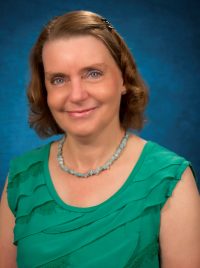By Post Author Nora Galvin, CG®
Julia Bagwell became Certified Genealogist® #1079 in August, 2016. Julia is a resident of Henderson, Colorado, but grew up in Freehold, New Jersey. Her ancestral roots in North America are found primarily in Pennsylvania and Maryland. She has done extensive family research in Pennsylvania records, but she also researches Colorado families for others. Her immigrant ancestors have inspired her. “The strength and fortitude it took for each one of them to do what they did is amazing to me.”

Julia Bagwell, CG®
With an abiding passion for genealogy and “a soft spot for history,” Julia spent childhood time in the historic northeast pondering, “Who were these people who lived here so long ago, who walked on this same ground that I am walking on?” This became a refrain in her life. “It took many decades to surface, but I finally discovered what I wanted to be when I grew up — a genealogist.”
Once this understanding synthesized, Julia felt she wanted a credential before beginning to work as a professional or submitting articles for publication. She decided that BCG certification was the credential she wanted, so she began pursuing it but did not “go on the clock” for several years. She used the following action plan.
- I kept returning to the Application Guide regularly until I felt I was ready. For me, knowing the expectations was critical.
- I continually sought out education opportunities. Hobbies generally follow a “learn as you go” path. I wanted to learn and apply what I was learning the right way.
- My research and analysis never stopped. Practice, practice, practice.
- I wrote my rough draft before going on the clock. This allowed me to focus on the fine tuning—the details, the citations and analysis—while my clock was ticking.
- I attended events that displayed completed portfolios. This was extremely helpful.
Julia has some advice for genealogists aspiring to certification: “First of all, be sure that this is something you really want to do. Then make sure you have the time to be serious about it. It requires a lot of hard, dedicated work. Get as much education regarding genealogical research methods and skills as possible. Invest in your must-have books, i.e., Mills’s Evidence Explained and Professional Genealogy and Greenwood’s Researcher’s Guide to American Genealogy. Read them cover to cover, multiple times. Take webinars and attend at least one National Genealogical Society conference putting an emphasis on the BCG Skillbuilding track. In addition, practice writing case studies and a kinship determination project. I rewrote my case study at least ten times before I finally said 'enough.’ That wasn’t because of my evidence as much as it was finding a way that flowed in an interesting as well as logical manner. In addition, read as many case studies in the National Genealogical Society Quarterly as you possibly can. Study how this journal formulates its case studies.” She feels that the BCG Action Forum was beneficial, and particularly appreciated supportive comments from Elissa Scalise Powell and Michael Hait.
Julia’s genealogy activities include active membership in the NSDAR Fort Vasquez Chapter and working as an NGS volunteer. Starting a genealogy business and publishing articles are goals Julia hopes to achieve in the next few years. She wants to repeat the enjoyment of “introducing others to their ancestors” via professional work. “There is no question that certification has changed the quality of my work. Adhering to the Genealogical Proof Standard is so important to ensuring professional quality work.”
Finally, Julia recites a warning many genealogists know well: “People who know me know they best be mindful of time when they ask me a genealogical based question—there is no short, easy escape.”
Good luck with your research and goals, Julia. And congratulations!
The words Certified Genealogist and letters CG are registered certification marks, and the designations CGL and Certified Genealogical Lecturer are service marks of the Board for Certification of Genealogists®, used under license by board certificants after periodic evaluation.